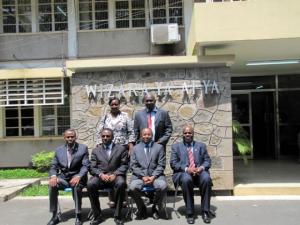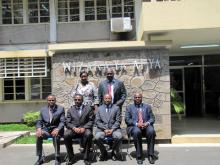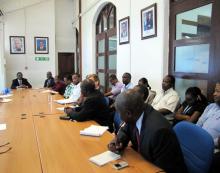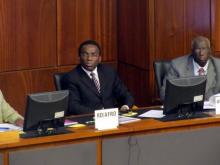The WHO Regional Director for Africa, Dr. Luis Sambo, attends the 4th Annual Regional Conference on Immunization in Dar Es Salaam, Tanzania
On 12th December, 2012, The WHO Regional Director for Africa, Dr. Luis Sambo visited the United Republic of Tanzania mainly with the purpose to participate in the 4th Annual Regional Conference on Immunization.
During his visit the Regional Director had an opportunity to interact with the Minister for Health and Social Welfare, Hon. Dr. Hussein Mwinyi at the Ministry of Health and Social Welfare premises. In their discussions, the Regional Director noted with satisfaction the very good working arrangements with partners which is reflected in the support the country enjoys. On the human resource for health crisis, the Minister for Health and Social Welfare described existing challenges, citing the examples of recurrent doctors’ strikes and shortage of health care workers (currently at 51%). He explained how these challenges are being addressed guided by the Human Resource for Health Plan.
The rising challenge of non-communicable diseases was also discussed and the Regional Director emphasized on the need for advocacy with other non-health sectors and a strategy for prevention of non-communicable diseases with a focus on the behavioural risk factors namely: harmful use of alcohol, smoking, unhealthy diet and physical inactivity. On Neglected Tropical Diseases, Dr. Sambo stressed on the need for clear guidance for policy and programmes in the African region and encouraged further discussion on the matter in one of the future meetings with Health Ministers.
The Regional Director also visited the WHO Country Office and had an interactive session with the WCO staff.
Dr. Sambo began by commending WCO performance as complimented by the Minister for Health and Social Welfare. He then went on to update the WCO staff on the on-going WHO reforms which aim for improved health outcomes, greater coherence in global health and organizational excellence. In the discussions he elaborated on the three key areas reflected in the reform process namely; Programme and priority setting, Governance reform and Managerial reform. He further highlighted the implications of the reform process to WHO staff.
Discussions were concluded by a vote of thanks and presentation of a gift to the Regional Director by the Staff Association Chairperson, Dr. Neema Simkoko, on behalf of WCO staff.
The Regional Director then proceeded to address participants of the 4th Annual Regional Conference on Immunization with concluding remarks. Dr. Sambo began his remarks by describing immunization as one of the most powerful and cost-effective public health interventions and urged countries to do more to increase the uptake of new vaccines.
He commended African countries for successes achieved over the last year including:
- Strong political commitment in strengthening national immunization programmes and significant progress made in improving immunization coverage.
- Countries’ adoption of the Global Vaccine Action Plan and launch of the new decade of vaccines.
- Development and introduction of new vaccines into countries’ immunization schedules
- Countries’ commitment to eradicate polio
- Progress in research and technology for development of new vaccines
He further stated that the levelling off, and, in some cases, the decline of routine immunization coverage in many countries in the region called for vigorous action to reverse the dangerous trend. Citing the significant reduction in the number of wild polio virus cases and the geographic spread of polio transmission in the African Region in 2012; Dr. Sambo added that “the situation in Nigeria, the only polio endemic country in the region is alarming and calls for renewed efforts and increased commitment particularly at operational level.”
Dr. Sambo also highlighted on the role of social scientists in ensuring communities are provided with the right information on the value of vaccination because awareness is directly proportional to demand in increasing immunization coverage. He further underlined the need to strengthen the Task Force on Immunization in its role of providing policy guidance to WHO with regard to vaccines and immunization.
Dr. Sambo concluded by pledging the commitment of WHO to engage actively with the different partners and stakeholders in order to generate knowledge, provide guidance and share best practices to help further strengthen the performance of national immunization programmes.







